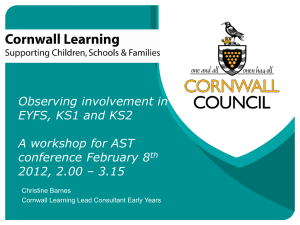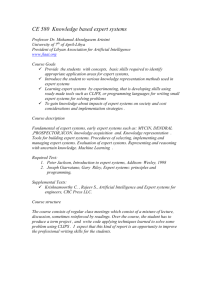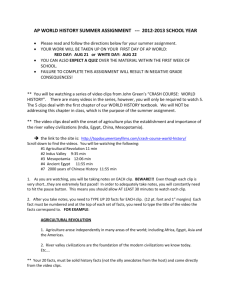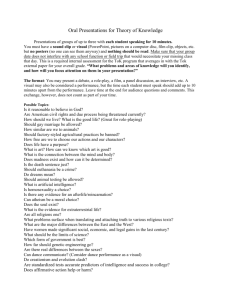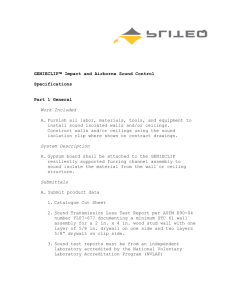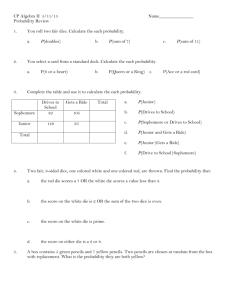Film Clips for Character Education
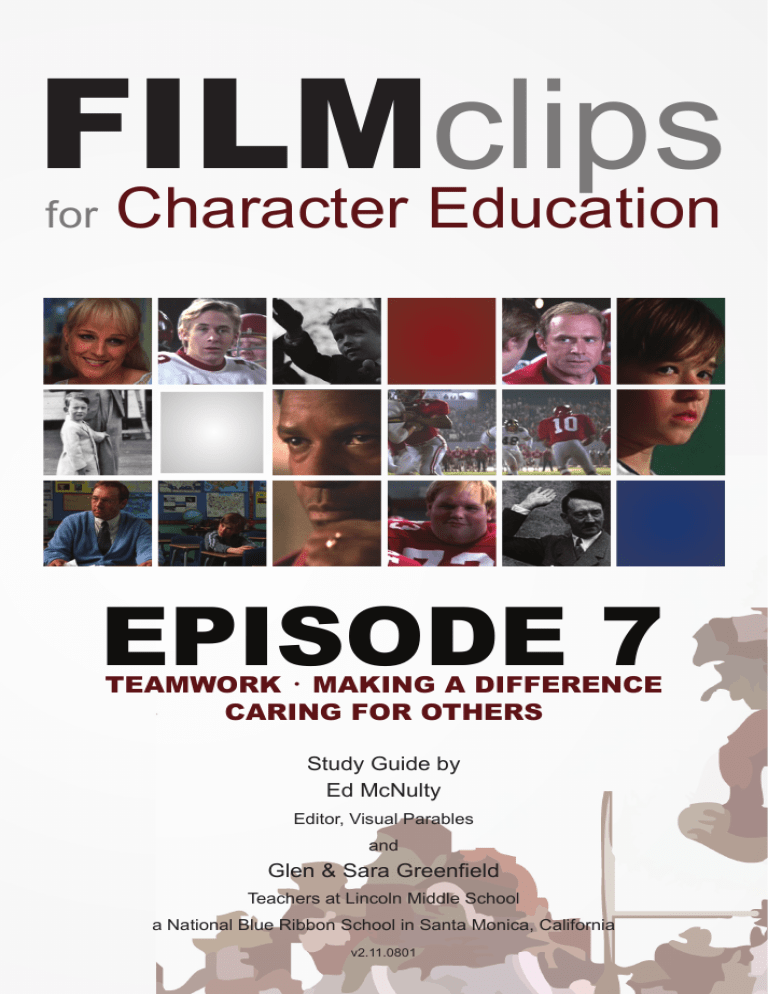
FILM
clips
for
Character Education
EPISODE 7
TEAMWORK
・
MAKING A DIFFERENCE
CARING FOR OTHERS
Study Guide by
Ed McNulty
Editor, Visual Parables and
Glen & Sara Greenfield
Teachers at Lincoln Middle School a National Blue Ribbon School in Santa Monica, California v2.11.0801
Table of Contents
(CLICK A THEME OR CLIP BELOW TO JUMP TO PAGE)
(FOR ADDITIONAL RESOURCES CLICK HERE)
MAKING A DIFFERENCE - PAY IT FORWARD
The Trailer
The Assignment
It Has to be Something Big
Before it’s too Late
TEAMWORK - REMEMBER THE TITANS
The Trailer
If You Survive
Attitude Reflects Leadership
Rule it Like Titans
Make Sure They Remember
Go Give it to Him
CARING FOR OTHERS
INTO THE ARMS OF STRANGERS
The Trailer
Ursula’s Birthday Party
A Promise Every Parent Made
Kurt Meets His Foster Family
I Was Meant to Survive
All clips are under copyright and are used with permission from copyright holders.
None of the movies represented in the Film Clips Series is rated higher than PG-13 by the Motion Picture Association of America, except for three of the movies in Episode
Eight (“Glory”, “Born on the Fourth of July”, and “Saving Private Ryan”). No inappropriate material is included in any of the individual film clips.
Educational Standards
The film clips in this series meet the performance standards.
Spanish/English Options
Options for audio and subtitles in English or Spanish are available in “Settings” on the main menu of the DVD. Spanish audio is available for most, but not all film clips.
2
Film Clips
Features short scenes from current major motion pictures.
These clips are designed to be “discussion starters” for junior and senior high school students in the areas of social studies,
English, history and life skills.
How to Use Film Clips
Preview the Video Cassette.
Pick the Clips that are appropriate for your lesson plan.
Show the clip to your class.
Stop the video after each clip and discuss.
Only use what you need to get a great discussion started.
What else should I know?
None of the movies represented in the Film Clips series is rated higher than PG-13 by the Motion Picture Association of
America. No inappropriate material is included in any of the individual Film Clips.
Film Clips meets the national and state educational standards
Film Clips
is a Pilot Project Produced by
Michael Rhodes Films
In Association With
The Los Angeles County Office of Education.
Clips in this Reel Courtesy of
Warner Brothers & Walt Disney Pictures
3
Film: Pay It Forward
(PG-13)
Themes:
Challenging the Mind/Changing the World/Making the Ideal Real/
Student-Teacher Relationships
Social Studies teacher Eugene
Simonet (Kevin Spacey) gives his class an assignment: look at the world around you and fix what you don’t like. Mr. Simonet’s student, Trevor McKinney (Haley
Joel Osment) comes up with a concept for changing the world:
“Pay It Forward.” But can you fix people?
Trailer 2:15
Clip #1
“The Assignment” 1:24
Focus question:
Is it possible for a single person to change the world?
Cluster/Brainstorm:
On an overhead projector or classroom board, cluster students’ responses to the following question. What are some things you would like to see changed in your family, school, community, or the world as a whole?
Discuss:
Has anyone ever done anything for you, which made a real difference in your life— something you couldn’t have done on your own?
Journal Entry/Writing Prompt:
Name three realistic things you might be able to do about these problems. Choose one solution you would be willing to act upon and explain why you chose this particular solution.
Share journal entries if time and lesson plan allow.
4
Clip #2
“It Has to be Something Big” 1:30
Focus Question:
Is “Pay it Forward” realistic?
Cluster/Brainstorm:
What are the good aspects of this plan? What, if anything, is bad about the plan? (This cluster may work best in a T-chart format.)
Discuss:
Trevor says, “It has to be big,” when paying it forward. Do you agree or disagree with this statement? Explain with examples to illustrate your point.
How might your family, school or community change if you and some of your friends tried a “Pay it Forward” type of plan?
Clip #3
“Before It’s Too Late” 0:51
Focus question:
What if your idea doesn’t work?
Discuss:
How important is being successful to “Paying it Forward?” Explain.
For More Information:
“Pay It Forward” was inspired by a book written by Catherine Ryan Hyde, critically acclaimed author of Funerals for
Horses and numerous short stories. You can find out more about Catherine
Hyde and read an excerpt from her book, Pay it Forward at: http://payitforward.warnerbros.com
5
Film: Remember the Titans
(PG)
Themes:
Teamwork/Race Relations/Character
Based on a remarkable true story, “Remember the Titans” follows the explosive dramatic events that took place in
Alexandria, Virginia in 1971 when African American football coach, Herman Boone (Denzel
Washington) was hired to guide an integrated but racially polarized high school team – the T.C.
Williams Titans. Angry, stubborn and a rigid task master, Boone faces a cool reception from the team’s players as well as an awkward reception with assistant coach Bill Yoast (Will Patton), a local white coach (with seniority and a tradition of winning) who was bypassed for the job.
As the two men learn to overcome their ignorance and bigotry, they work together to transform a group of angry unfocused players into a dynamic winning team of responsible young men. In the process, they also unite a divided community and insure that Virginia will always “Remember the Titans.”
Trailer 2:20
Clip #1
“If You Survive” 1:36
Focus Question:
Is belonging to a team a good thing?
6
Discuss :
What would you be willing to sacrifice to belong to a team?
What wouldn’t you sacrifice?
Are freedom and responsibility two sides of the same coin?
Clip #2
“Attitude Reflects Leadership” 1:15
Focus Question:
How can a leader gain respect?
Discuss:
What advice would you give the two players in this situation?
To what degree does racism exist at your school or in your community?
Give examples.
Post-write:
How can the ideals of teamwork reduce racism within your school, community and the world? Have students share their responses.
Clip #3
“Rule It Like Titans” :52
Focus Question:
What makes a great team?
Discuss:
Have you ever belonged to a
“great” team? What made it
7
“great?” Is a “great” team necessarily a winning team?
Vince Lombardi, former coach of the Green Bay Packers, once said, “Winning isn’t everything; it’s the only thing.” Do you agree?
Clip #4
“Make Sure They Remember” 2:52
Focus Question:
What if the Game isn’t Fair?
Discuss:
What are some positive and negative ways people handle unfair situations? How would you handle a situation that wasn’t fair? What if people disagree about the fairness of a situation? What resources are available?
Clip #5
“Go Give it to Him / He’s Better” 1:17
Focus Question:
When is it right to put the team first? When isn’t it?
Discuss:
When the coach benched one of his star players, was it right for the other player to question his judgment?
Did the player question his coach’s judgment or his authority?
What’s the difference?
8
When is it right to question authority?
Is there a right or a wrong way to do it?
Post-write:
How can the ideals of teamwork reduce racism in your school, community, and the world as a whole? Have students share their responses.
For More Information:
To learn more about the real T.C. Williams Titans: http://www.disney.go.com/disneypictures/rememberthetitans
Film: Into the Arms of Strangers: Stories of the
Kindertransport
(PG)
Themes:
Family & Social Responsibility/
History/Prejudice
For nine months prior to World War
II, in an act of mercy unequaled anywhere else before the war,
Britain conducted an extraordinary rescue mission, opening its doors to over 10,000 Jewish and other children from Germany,
Austria and Czechoslovakia. These children were taken into foster homes and hostels in Britain, expecting eventually to be reunited with their parents. The majority never saw their families again.
“Into the Arms of Strangers” is a documentary feature about this remarkable rescue operation and its dramatic impact on the lives of the children who were saved. Told in the words of the survivors, rescuers, parents, and foster parents, these are the stories of those who survived with the help of others. They are stories of courage and hope, stories about the strength and resolve of children; and stories rarely heard about the impact of the holocaust.
9
For more specific historical information regarding the Kindertransport visit the history section of this website: http://www intothearmsofstrangers.com
Trailer: 2:10
Clip #1
“Ursula’s Birthday Party” 0:42
Focus Question:
Why do you think no one came to
Ursula’s birthday party?
Discuss/Research:
What was the social/political climate of Germany in 1939?
Are there any comparable situations in the world today? E.g.: Ethnic cleansing in Darfur and Iraq, conflicts in Indonesia, Pakistan, etc.
How are these situations different? How are they the same?
The Pledge of Allegiance makes a commitment to “...one nation, under God, indivisible with liberty and justice for all”.
This pledge is recited every day and reflects the ideals of our nation. Yet, racism and prejudice still exist. Describe a time when you realized that all people are not treated equally.
Have you ever experienced discrimination first hand? Explain.
Writing Activity:
Pretend it is 1938 and you are a Jewish young person living in
Germany. Your best friend writes you a note explaining why he or she could not come to your birthday party. What might your friend have written to you? How would you respond?
10
Clip #2
“A Promise Every Parent Made” 1:38
Focus Question:
Why do you think these parents gave up their children?
Discuss/Research:
Why couldn’t these parents accompany their children to
England? Why didn’t England open it’s doors to Jewish adults as well as Jewish children?
Why didn’t the United States open its doors to more Jewish
émigrés seeking political asylum?
Why did many Latin American countries open their doors?
Writing Activity:
Pretend it is 1938 and you are the parent of a Jewish young person living in Germany. You hear of an opportunity to send your son or daughter to England, but you will not be allowed to accompany them. Write a letter to your child expressing your reasons for sending them or not sending them to England.
Conclude by expressing your wishes for their future and what you hope they will become when they grow up.
Clip #3
“Kurt Meets his Foster Family” :35
Focus Question:
Why do you think British families took these children in?
11
Discuss/Research:
What were the risks and what were the rewards to these families?
What are the immigration and political asylum policies of the
United States?
Writing Activity:
Pretend it is 1938. Write a letter to your Congressman encouraging him to accept or not accept more European
émigrés. Write a second letter from your congressional representative explaining his position on this matter.
Write a letter to your congressional representative promoting or rejecting the U.S. policy on immigration today.
Connect:
End this session with a large group discussion. It has been said, “The only thing necessary for evil to succeed in the world is for good people to do nothing.” How does it apply to Nazi
Germany and the English families who took in children from the kindertransport? How might this apply today to you, your school, and your community? Give examples.
Clip #4:
“I Was Meant to Survive” 1:05
Focus Question:
What is your purpose in life?
Discuss/Research:
How can a clear purpose help in hard times?
The Declaration of Independence, The Bill of Rights, The
United Nation Charter, and the Declaration of Human Rights are all declarations of purpose. What do they have in common? How are they different?
12
Many corporations have created mission statements. Write a personal mission statement. How might this mission statement change over time? How would it remain the same?
For More Information:
“Into the Arms of Strangers” Website http://www.intothearmsofstrangers.com
The United States Memorial Holocaust Museum (Washington, DC) http://www.ushmm.org
The Museum of Tolerance (Los Angeles, Ca.) http://www.wiesenthal.com/mot
Books Available on this Subject:
Into the Arms of Strangers: Stories of the Kindertransport
By Mark Jonathan Harris, Deborah Oppenheimer (Sept. 2000)
Kindertransport by Olga Drucker (October 1999)
Ten Thousand Children: True Stories told by Children who Escaped the
Holocaust on the Kindertransport
By Anne L. Fox (Epilogue), Eva Abraham-Podietz (Epilogue) (December
1998)
Witness: Voices from the Holocaust
Joshua M. Greene and Shiva Kumar, Editors (April 2000)
The discussion questions and writing activities in this study guide adhere to the following national and state educational standards:
National Standards for
School Counseling Programs
Academic:
(5) Students will acquire the attitudes, knowledge and skills that contribute to effective learning in school and across the life span.
13
Personal/Social Development:
(1) Students will acquire the attitudes, knowledge and interpersonal skills to help them understand and respect themselves and others.
(1.0) Students will make decisions, set goals and take necessary action to achieve goals.
California State Standards
English 8 Writing Strategies:
(1.0) Students support theses or conclusions with analogies, paraphrases, quotations, opinions from authorities, comparisons and similar devices.
English 9/10 Listening and Speaking:
(1.0) Students formulate adroit judgments about oral communication. They deliver focused and coherent presentations of their own that convey clear and distinct perspectives and solid reasoning. They use gestures, tone and vocabulary tailored to the audience and purpose.
English 11 Writing Strategies:
(1.3) Students structure ideas and arguments in a sustained, persuasive and sophisticated way and support them with precise and relevant examples.
History 6 Research, Evidence and Point of View:
(5) Students detect the different historical points of view on historical events and determine the context in which the historical statements were made (the questions asked, sources used, author’s perspectives).
14
History 9 Historical Interpretation:
(1) Students show the connections, causal and otherwise, between particular historical events and larger social, economic and political trends and developments.
History 11 U.S. History and Geography:
(11.11) Students analyze the major social problems and domestic policy issues in contemporary American society.
History 12 Principles of American Democracy and
Economics:
(12.3) Students evaluate, take and defend positions on what the fundamental values and principles of civil society are (i.e., the autonomous sphere of voluntary personal, social, and economic relations that are not part of government), their interdependence, and the meaning and importance of those values and principles for a free society.
California State Standards for the
Teaching Profession
(1.1) Teacher connects students’ prior knowledge, life experience, and interest with learning goals.
(1.1) Teacher facilitates learning experiences that promote autonomy, interaction and choice.
(1.3) Teacher engages students in problem solving, critical thinking and other activities that make subject manner meaningful.
(1.3) Teacher promotes self-directed, reflective learning for all students.
15
Please Visit us at:
www.FilmClipsOnLine.com
You’ll find many additional resources on line
The California Learning Resources Network (CLRN) and
The California Department of Education have approved Film Clips for legal and social content compliance with the California Education Codes sections
60040-60044, and 60048, as well as State Board of Education guidelines which are outlined in the document,
Standards for Evaluating Instructional Materials for Social
Content (2000 edition)
16
Film Clips
SPIRIT OF AMERICA
Produced by Michael R. Rhodes www.FilmClipsOnline.com
4903 Island View Street
Channel Islands Harbor
California 93035
Phone: (805) 984-5907
Fax: (805) 984-2397
E-mail: info@filmclipsonline.com
Study Guide design by Scott C. Gold • ScottCGold@gmail.com

